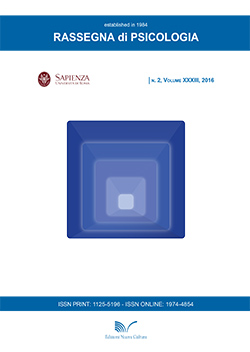Sleep inertia as a risk factor for intrusive thoughts and rumination
DOI:
https://doi.org/10.13133/1974-4854/16652Keywords:
rumination, thought suppression, intrusive thoughts, morningnesseveningness, social jet-lagAbstract
Literature shows that people having their peak performance in the evening (as opposed to morning) tend to experience greater sleep inertia during working days because they accumulate a sleep debt that it is compensated only during the weekend (also known as “social jet-lag” effect). Such sleep inertia not only determines lower efficiency but also lower alertness during morning, a condition that favors the increase of both thought suppression and ruminative processes. The present study is aimed to investigate whether the relationship between sleep inertia and the increase in ruminative processes is mediated by thought suppression. A sample of university students was involved in a cross-sectional study. Results support the mediation effect of thought suppression. The present study, even if with all the limits of the cross-sectional design, discuss results supporting the hypothesis that people with greater sleep inertia in their attempt to deal with negative mood tend to recur too often to maladaptive strategies like thought suppression that however have the paradoxical effect to increase ruminative thoughts and lastly increase their negative mood.Downloads
Published
2016-12-20
Issue
Section
Articles
License
Copyright (c) 2016 Silvia Mazzuca, Marika Rullo, Fabio Presaghi

This work is licensed under a Creative Commons Attribution 4.0 International License.

